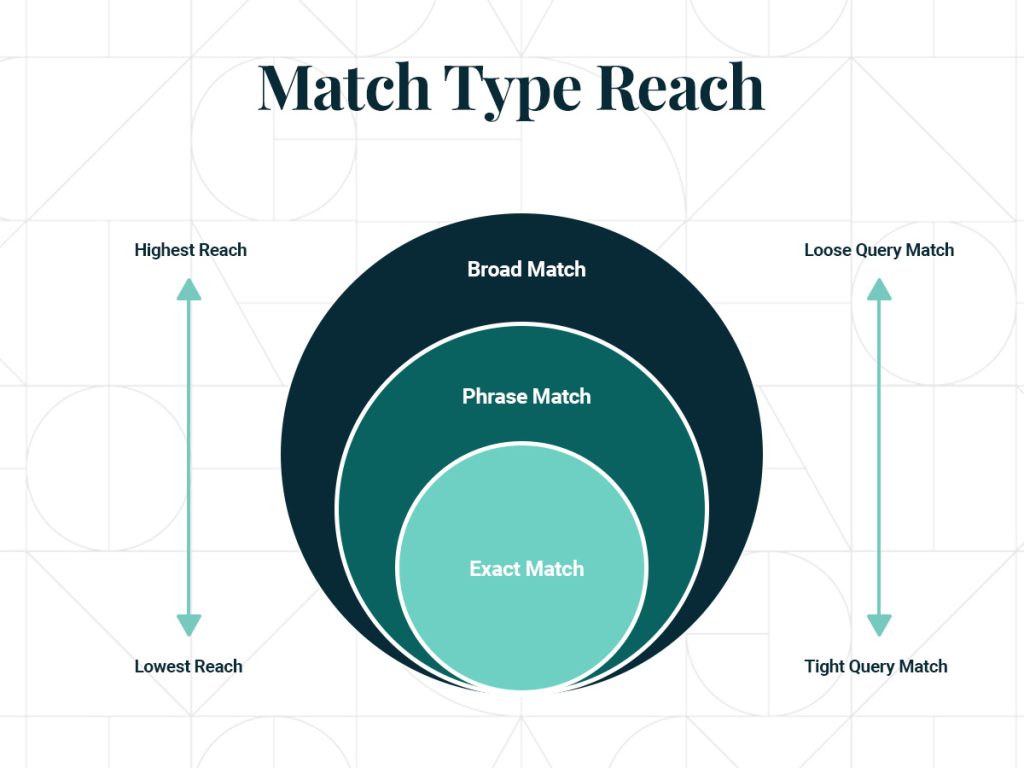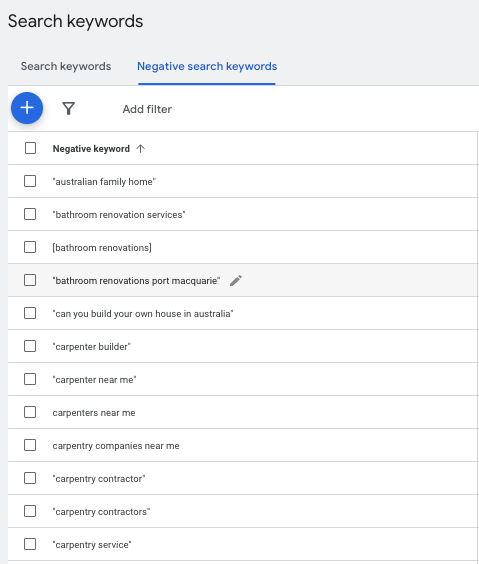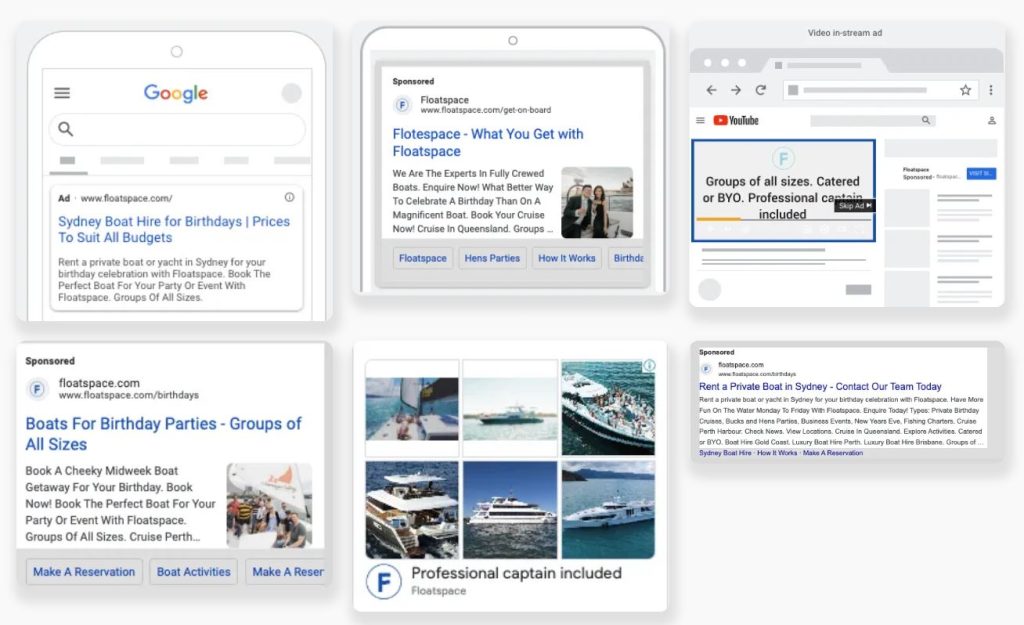Lessons learned auditing Google ad accounts in multiple industries
Are you using Google Ads to promote your business? If so, understanding keyword match types is crucial. These settings can determine when your ads appear. Choose the right ones, and your ads will reach people ready to buy.
This strategic approach can lead to significant success, boosting your business and your confidence. Pick the wrong ones, and you’ll waste a lot of money.
But fear not, with the right knowledge, you can turn this around and make your ad spend work for you.
What Are Keyword Match Types?
There are three main match types in Google Ads:
1. Broad Match: Your ad shows for any search with those words in any order. This casts a wide net but can show your ad to people not interested in your product.
2. Phrase Match: Your ad shows for searches that include your exact keyword phrase with extra words before or after. This is more targeted than a broad match.
3. Exact Match: Your ad only shows for searches that exactly match your keyword. This is the most targeted but most restrictive option.
Choosing the Best Keyword Match Type
The ideal match type depends on your advertising goals, budget, and target audience. Experimenting with different match types can help you determine which one works best for your home renovation company in Sydney.
- If your goal is maximum visibility: Start with broad match and refine your targeting as needed.
- If you want to balance reach and relevance: Phrase match is a good option.
- If you prioritise highly relevant traffic and are willing to sacrifice some reach: Exact match is the way to go.
By understanding match types and strategically choosing the best option for your business, you can maximise your advertising efforts and attract qualified leads in the competitive Sydney market.

How Match Types Impact Your Ad Spend
Let’s look at an example of how these match types can impact your ad spend for “Home Renovations Sydney”:

Broad Match: If you use broad match for Home Renovations Sydney, your ad may show for searches like “Sydney home renovations”, “home renovation services Sydney”, “Sydney home renovation companies”, etc. This can lead to a higher cost per click and a lower return on investment due to irrelevant traffic.

Phrase Match: If you use phrase match for “Home Renovations Sydney”, your ad may show for searches like “Sydney home renovations”, “home renovation services in Sydney”, “Sydney home renovation companies”, etc. This can lead to a higher return on investment due to more relevant and qualified traffic.

Exact Match: If you use exact match for “Home Renovations Sydney”, your ad will only show for searches that exactly match that phrase. This can lead to the highest return on investment due to the most relevant and qualified traffic.

Negative Keywords: By using negative keywords like “cheap,” “free,” or “DIY,” you can prevent your ads from showing for irrelevant searches and focus on reaching the right users.

Understanding how match types impact your ad spend and using the right strategies can maximise the ROI of your PPC ads for “Home Renovations Sydney.”
Common Mistakes to Avoid
- Using too many broad-match keywords can quickly drain your budget with irrelevant clicks.
- Neglecting negative keywords: Not using negative keywords can make your ads appear for irrelevant searches.
- Ignoring search term reports: Regularly review search term reports to refine your keyword strategy.
Google Ads Client Case Study: FloatSpace
FloatSpace, a Sydney based concierge service for boat and yacht rentals, needed to reduce cost per acquisition (CPA) due to decreased conversion rates despite increased ad spending, to combat high Google Ads costs affecting cash flow.
Netstripes enhanced conversion rates by targeting high-value keywords and retargeting ads to improve conversions. The outcome: within 30 days, acquisition costs decreased by 30%.

Over six months, the cost per lead acquisition was reduced by 38%; year-on-year, the price per sale was halved in 2023. For the entire case study, click here.
Advanced Tips
- Utilise Smart Bidding: Use Google’s Smart Bidding strategies to automatically adjust bids based on the likelihood of conversions.
- Leverage Audience Targeting: Combine keyword match types with audience targeting for more precise ad delivery.
- Regularly Test and Adjust: Test different match types and adjust based on performance data.
Why Ad Reps May Not Be the Best Resource for Google Ad Match Types Advice
Many advertisers assume that their account representatives (ad reps) are experts in every aspect of Google Ads. However, this is not always the case.
While ad reps are well-versed in the overall functionality of Google Ads and can provide valuable insights, they may not be experts in the technical details of keyword match types.
Their primary focus is helping advertisers achieve their marketing goals and ensuring campaigns run effectively.
They may not have the same level of expertise as specialised teams or advertisers who work with the platform daily.
Therefore, while ad reps can be a valuable resource, advertisers need to take the initiative to learn about keyword match types and how to use them effectively.
Tips to Avoid Wasted Ad Spend
To get the most from your Google Ads budget, here are some practical tips:
- Use exact matches for your most important keywords.
- Add negative keywords to prevent irrelevant searches.
- Use phrase match for medium-volume keywords.
- Use broad matches sparingly and only for very relevant searches.
- Monitor your ad spend and adjust match types as needed.
Understanding match types and using them correctly can make your Google Ads work harder for your business. Avoid wasting money on irrelevant clicks and reach the people most likely to buy from you.
Conclusion
Keyword match types are crucial to Google Ads but can also be a significant source of waste if not used correctly.
By understanding the different match types and how they impact your ad spend, you can avoid wasting money and ensure that your ad spend is targeted and effective.
Ready to optimise your Google Ads? Start by auditing your current keyword match types and making the necessary adjustments.
Need help? Book a free consult with a netstripes’ specialist to maximise your ad spend efficiency.



